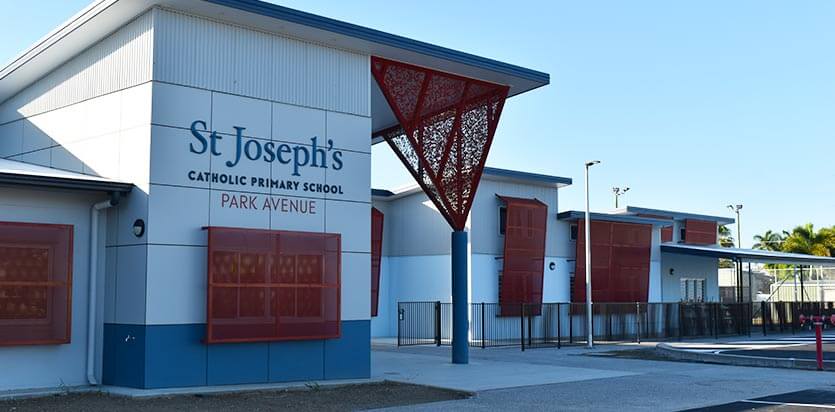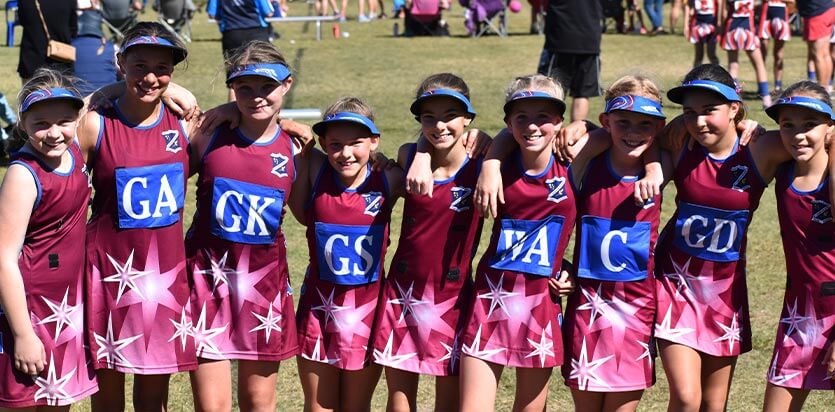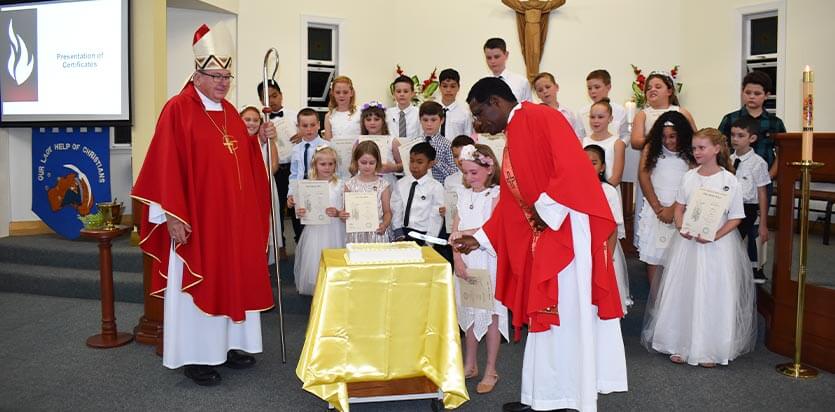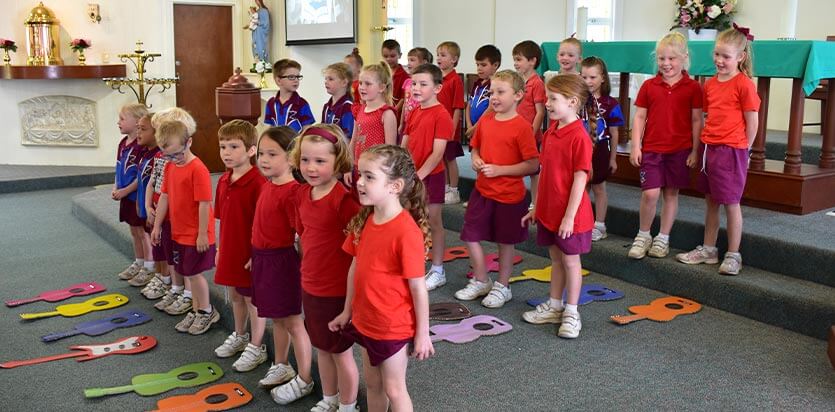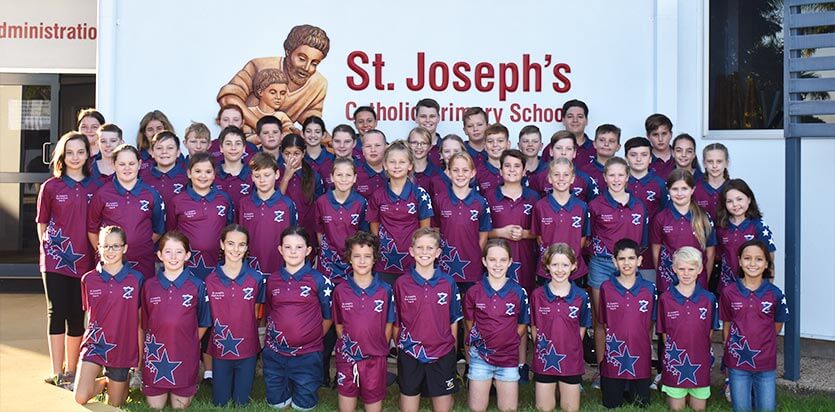Our curriculum is guided by the Australian Curriculum documents, Diocesan Learning Framework and Diocesan directives. The learning area of Religious Education is guided by the Diocesan Religious Education Syllabus documents.
The curriculum is divided into the learning areas of:
At St Joseph’s Catholic Primary School Park Avenue, we strive to create a safe, positive and dynamic learning environment where each person in our community is valued and empowered.
We believe that students need to be both challenged and supported. We deliver the Australian curriculum in a way which is responsive, relevant and purposeful for our learners.
At St Joseph’s we provide a relevant education which encourages:
Learner centeredness:
Care and transformation:
A community of thinking and learning:
Our curriculum is guided by the Australian Curriculum documents, Diocesan Learning Framework and Diocesan directives. The curriculum is divided into the learning ...
Our curriculum is guided by the Australian Curriculum documents, Diocesan Learning Framework and Diocesan directives. The curriculum is divided into the learning areas of Religious Education, Mathematics, English, Humanities and Social Sciences, Science, Technologies, Health and Physical Education, and The Arts. The learning area of Religious Education is guided by the Diocesan Religious Education Syllabus documents.
At St Joseph’s, teachers collaboratively plan relevant and engaging learning experiences in which students are challenged and supported to set and achieve academic goals. Students are provided with opportunities to apply their learning to relevant and purposeful contexts as they build their knowledge and skills to deepen their understanding.
We believe in providing students with opportunities to succeed in all subject areas of the Australian Curriculum. We have passionate specialist teachers to provide students with instruction in the areas of Physical Education, Music, Drama, Dance and Visual Arts.
Assessment is an ongoing process which ensures a balance of assessment for learning, assessment as learning and assessment of learning ...
Assessment is an ongoing process which ensures a balance of:
• Assessment for learning – assists teachers to use information about a student’s progress to inform teaching and learning goals
• Assessment as learning – enables students to reflect on and monitor their own progress to inform their future learning goals
• Assessment of learning – assists teachers to use evidence of student learning to assess achievement against goals and standards
A range of assessment tools are used to ensure the varied learning styles and abilities of students are catered for.
Assessment across the school consists of a collection of student work (work samples, writing samples, digital photos), formal testing and running records.
A range of diagnostic data is used to guide teachers with targeted teaching opportunities and individual student goal setting.
Our teachers provide parents/caregivers with a written report at the conclusion of each semester. This report provides parents/caregivers with information relating to their child’s achievement of the Australian Curriculum, the effort their child has exhibited across different subject areas as well as an indication of general work and study habits shown throughout the semester.
Students in Prep are assessed against the Prep Curriculum using the following achievement scale – Applying, Making Connections, Working With, Developing, Becoming Aware.
Students in Years 1 and 2 are assessed on the Australian Curriculum against a five-point achievement scale with the reporting descriptors of: Very High, High, Sound, Developing, Support Required.
Students in Years 3-6 are assessed on the Australian Curriculum against a five-point achievement scale with the reporting descriptors of: A,B,C,D,E.
We encourage our learners to work with their teachers to develop personal learning goals in the areas of numeracy, reading and writing. These goals are derived from data analysis, teacher ...
We encourage our learners to work with their teachers to develop personal learning goals in the areas of numeracy, reading and writing. These goals are derived from data analysis, teacher observations and conversations with students. Students and parents are made aware of their goals and regularly work towards monitoring and achieving them. Teachers encourage students to strive for growth every day through encouragement, meaningful feedback and regular acknowledgment of success.
Academic awards are presented at the end of each semester of learning. The purpose of this process is two-fold: to recognise academic achievements and to provide motivation for students to strive to improve their academic results and efforts.
These academic awards consist of:
• Gold Academic Awards which are presented to students in Years 1-6 who have achieved 6 or more As or VHAs including an A or VHA in the Key Learning Areas of Religious Education, English and Mathematics. These students must also achieve a passing grade in all Key Learning Areas.
• Silver Academic Awards which are presented to students in Years 1-6 who have achieved 5 As or VHAs with at least two of these As or VHAs being in the Key Learning Areas of Religious Education, English or Mathematics. The student must also achieve a passing grade in all Key Learning Areas.
• Bronze Academic Awards which are presented to students in Years 1-6 who have achieved 4 As or VHAs with at least one of these As or VHAs being in the Key Learning Areas of Religious Education, English or Mathematics. The student must also achieve a passing grade in all Key Learning Areas.
• Maroon Academic Awards which are presented to students in Years 1-6 who have achieved an A / VHA or B / HA in all Key Learning Areas.
• Blue Effort Awards which are presented to students in Years 1-6 who have achieved outstanding effort grades for a minimum of four Key Learning Areas.
Official Parent/Teacher interviews are offered twice a year around the middle of each semester. These interviews are opportunities for parents to gain an insight into their child’s progress and performance ...
Official Parent/Teacher interviews are offered twice a year around the middle of each semester. These interviews are opportunities for parents to gain an insight into their child’s progress and performance at this mid-point juncture. Students are encouraged to be active participants in these interviews.
Parents are welcome to make appointments with teachers at any time throughout the year to discuss their child’s progress.
Teachers provide students with regular feedback on their work.
At St Joseph’s, we believe that all students have a right to be both challenged and supported in their learning. Because of this belief, we ensure our learning sequences consist of ...
At St Joseph’s, we believe that all students have a right to be both challenged and supported in their learning. Because of this belief, we ensure our learning sequences consist of relevant, engaging and purposeful learning experiences in which students are supported to set and achieve learning goals. Students are provided with opportunities to apply their learning to relevant and purposeful contexts in an effort to deepen their understanding. Our learning environments provide opportunities for collaboration and differentiation for all learners.
Our school provides teachers with a substantial amount of assistance in all learning environments to provide students with the support they require. The school has specific Inclusive Curriculum teachers who support classroom teachers with teaching and learning. Each cohort is allocated a full time teacher assistant who works within the classroom space to provide support for students to access the curriculum. In addition to the full time teacher assistant, additional teacher assistants are allocated to students who meet the criteria for specific learning support.
St Joseph’s also provides teachers with access to an Indigenous Support Officer to help support the indigenous students and families in our school and provide the community with advice and opportunities to explore the indigenous culture.
All students requiring additional support are provided with the relevant Individual Education Plan, Educational Adjustment Plan and/or Individual Support Plan they are eligible for and the support which accompanies those plans.
St Joseph’s has a detailed Teaching and Learning Framework which consists of three integrated parts ...
St Joseph’s has a detailed Teaching and Learning Framework which consists of three integrated parts:
Part 1: School Vision and Mission
Part 2: School Curriculum Guide
Part 3: School-wide Pedagogical Model
